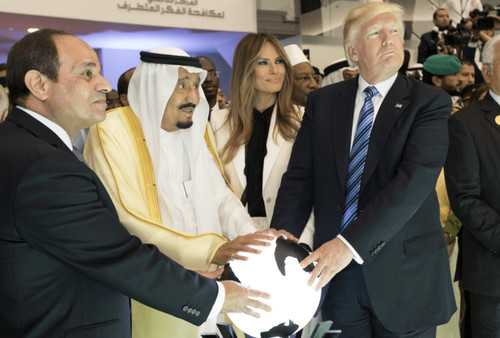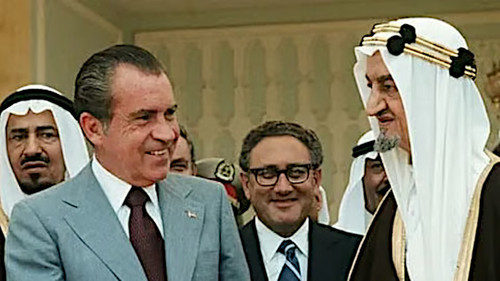Welcome to DU!
The truly grassroots left-of-center political community where regular people, not algorithms, drive the discussions and set the standards.
Join the community:
Create a free account
Support DU (and get rid of ads!):
Become a Star Member
Latest Breaking News
Editorials & Other Articles
General Discussion
The DU Lounge
All Forums
Issue Forums
Culture Forums
Alliance Forums
Region Forums
Support Forums
Help & Search
Environment & Energy
Related: About this forumThe Petrodollar - The US-Saudi Deal that Ruined the World

King Salman, Presidents Trump and el-Sisi inaugurate the Global Center for Combating Extremism by touching an illuminated globe of the Earth. Image Wikipedia.
The Petrodollar – The US-Saudi Deal that Ruined the World
The Petrodollar - The US-Saudi Deal that Ruined the World
CounterPunch | Daragh Cogley | March 10, 2025
“I’m going to Saudi Arabia. I made a deal with Saudi Arabia. I’d usually go to the U.K. first. Last time I went to Saudi Arabia they put up $450 billion. I said well, this time they’ve gotten richer, we’ve all gotten older so I said I’ll go if you pay $1 trillion to American companies, meaning the purchase over a four-year period of $ 1 trillion and they’ve agreed to do that. So, I’m going to be going there. I have a great relationship with them, and they’ve been very nice but they’re going to be spending a lot of money to American companies for buying military equipment and a lot of other things.” – President Donald Trump, 7th March 2025.
What is the true importance of the US-Saudi relationship in the global economy? It’s based on the two things that make the economy go round – money and oil.
The United States–Saudi “petrodollar” arrangement has underpinned American economic and military power for nearly five decades. In essence, oil exports from Saudi Arabia (and later OPEC broadly) have been priced in U.S. dollars since the 1974, ensuring a constant global demand for the dollar and U.S. Treasury assets. This monetary system forms the hidden backbone of a web of consequences – from U.S. imperialism and geopolitical maneuvering to environmental degradation and extreme wealth accumulation. Today, roughly 80% of global oil transactions are still conducted in USD, illustrating the petrodollar system’s enduring influence. Below, we analyze the historical origins of the petrodollar, explain how this monetary system became a root cause linking finance to geopolitics and ecological crisis, and discuss proposed alternatives like Modern Monetary Theory (MMT) that could break the cycle.
Background
In the aftermath of World War II, the Bretton Woods system (1944) established the U.S. dollar as the world’s anchor currency, pegged to gold, which cemented U.S. economic dominance. However, by 1971 the U.S. faced mounting trade deficits and dwindling gold reserves, as countries sought to trade USD for gold they didn’t have, US President Nixon ended dollar convertibility to gold – a move that threatened the dollar’s supremacy. The solution emerged via oil: in 1974, one year after the oil crisis, Washington and Riyadh struck a pivotal deal (kept secret until 2016) that ensured Saudi oil would be priced exclusively in dollars. In return, the U.S. provided military protection and lucrative arms sales to Saudi Arabia, and Saudi leaders would recycle their oil revenues into U.S. Treasuries and American investments. This U.S.–Saudi arrangement laid the foundation of the petrodollar system, firmly tying the world’s most traded commodity (oil) to the American currency.
The timing was crucial. The 1973 oil embargo had quadrupled oil prices from about $3 to $12 a barrel, sparking a global energy crisis. The U.S. sought to tame this “oil weapon” by binding oil exports to the dollar – thereby turning petrodollars into a pillar of U.S. financial might. By the late 1970s, most OPEC producers followed suit in trading oil for USD, and surplus petrodollars were funnelled into Western banks and U.S. debt. This recycling of oil revenues back into American markets propped up U.S. budget deficits and helped finance Cold War expenditures. In effect, oil-exporting nations accepted dollars (often investing them in the US) in exchange for security guarantees and access to American goods and technology. The long-term implications were profound: the dollar became the default currency for global oil trade, bolstering its reserve currency status and enabling the U.S. to maintain economic and military pre-eminence “almost as a matter of course”. This petrodollar order has remained largely intact through the present, anchoring U.S. dominance in the world economy.
2. The Monetary System as the Root Cause...more
https://www.counterpunch.org/2025/03/10/the-petrodollar-the-us-saudi-deal-that-ruined-the-world/
Trivia: France sent a warship, likely the aircraft carrier Béarn or a similar vessel, to New York in the 1960s and early 1970s to retrieve gold deposits from the New York Federal Reserve's vaults, a move to express skepticism about the US dollar's stability and end the Bretton Woods system.
Donnie Dump won't be the one to ditch this nightmare.
Unbelievably, some STILL call the "Petrodollar" a "Conspiracy Theory", which makes Dick and Hank weep, even in the afterlife.

Doesn't look like the guy on the left is very happy
1 replies
 = new reply since forum marked as read
Highlight:
NoneDon't highlight anything
5 newestHighlight 5 most recent replies
= new reply since forum marked as read
Highlight:
NoneDon't highlight anything
5 newestHighlight 5 most recent replies
The Petrodollar - The US-Saudi Deal that Ruined the World (Original Post)
Caribbeans
Wednesday
OP
The foreign governments and oil companies influence that installed the Shah.
multigraincracker
Wednesday
#1
multigraincracker
(36,263 posts)1. The foreign governments and oil companies influence that installed the Shah.
I think that's when it started.